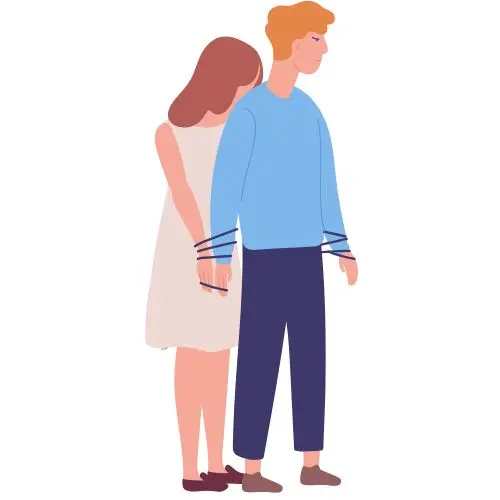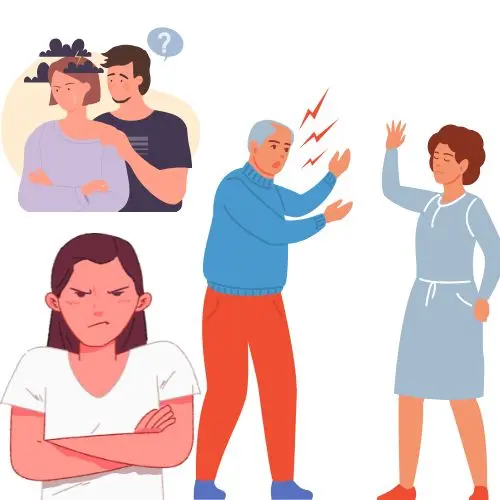Introduction
A couple in which the relationship alternates between idealization and devaluation will emerge from a love-hate relationship. Such challenging dynamics can develop in romantic, family, or friendly spaces. These things aren’t only good or bad; they mix intimacy and irritation into a mini roller-coaster of feelings.
Defining Love-Hate Relationships
This duality — of deep love and stark resentment — creates a love-hate relationship. It’s not just a rocky relationship. In contrast to a standard relationship, where animosities either get resolved or cut away, a love-hate relationship maintains an uninterrupted cycle of attachment and irritability. The individuals may love just as fiercely as they rage. That mix makes these relations different from just tough ones.
| Facts about Love-Hate Relationships |
| – Nearly 75% of people report having been in a love-hate relationship at some point in their lives |
| – The thrill of intense passion and conflict can cause adrenaline and dopamine levels to spike, mimicking addictive behaviors |
| – Toxic relationships take a huge psychological and physical toll over time through anxiety, stress, and emotional rollercoasters |
| – It takes an average of 7 breakups for someone to end a love-hate relationship for good finally |
| – Communication issues, unhealthy attachments, trauma bonding, and codependency are common underlying factors |
Characteristics of Love-Hate Relationships
What exactly makes a relationship a love-hate one? Here are some telltale signs:
- Frequent arguments and conflicts that seem to come out of nowhere
- Difficulty communicating needs and setting boundaries in a respectful way
- One or both partners are routinely disrespectful, hurtful, or abusive when angry
- Feeling emotionally dependent on the other person for a sense of identity or self-worth
- Using intimacy, affection, or reconciliation to “make up” after conflicts and arguments
- Struggling to imagine life or happiness without the other person despite the pain they cause
- Frequently breaking up but getting back together in a repeating unhealthy cycle
- Having an intense physical or sexual attraction but little sense of emotional safety or stability
- Feeling addicted to the “highs” of passion and reconciliation after the “lows” of conflict
Common Examples
Love-hate dynamics aren’t bound to romance alone. They can spring up in different walks of life:
- Romantic Relationships: Partners might deeply care for each other but have unresolved issues that cause friction.
- Familial Bonds: Siblings, parents, and children might experience this due to long-standing unresolved conflicts combined with familial love.
- Friendships: Close friends can enter this cycle, especially if underlying jealousy or competition festers alongside affection.
Psychological Insights into Love-Hate Relationships

Understanding why someone might get tangled in a love-hate relationship requires a dive into psychology. Several factors can play a role in these relationships forming and persisting.
Attachment Styles
Attachment styles are developed in early childhood and often influence our adult relationships. Here is what they could affect love-hate interactions:
- Anxious Attachment: People with anxious attachments often hold on tightly to those they love, but their worry about rejection can explode into fiery conflicts.
- Avoidant Attachment: These individuals might pull away to protect themselves (as they never learned secure attachment). So you may find a cycle whereby they draw back even when they care.
Emotional Regulation
It is not always easy to manage emotional regulation; when that lack exists, the love-hate stakes can feel even more intense. People can not manage their emotions well, which usually swings between love and hate. Avoiding the peaks and valleys is impossible, but regulating emotions may help smooth some of those out, creating a more equally managed relationship.
Impact of Love-Hate Relationships
While challenging, love-hate relationships aren’t purely negative. They can affect individuals in various ways.
Emotional Turmoil and Growth
As a result, there are many strains emotionally in these relationships that can take their toll — both on mental health. Yet, there’s room for growth. Experiencing these strong feelings can yield resilience and self-awareness, forcing a person to grow.
Breaking the Cycle
Breaking free from the love-hate cycle is possible. Here are some strategies:
- Self-Reflection: Understand your own role in the dynamic. Identify triggers and patterns.
- Open Communication: Honest dialogue about feelings and frustrations can ease conflicts.
- Setting Boundaries: Establish clear boundaries to protect emotional health.
- Seeking Professional Help: Therapy can provide tools to navigate and improve these relationships.
Moving On from a Love-Hate Relationship
Ending a love-hate relationship is an enormously difficult process that requires professional support. Some important steps include:
- Recognizing the toxicity and understanding that abuse is never acceptable, regardless of feelings of passion or dependency.
- Speaking to trusted friends or therapists to gain an objective perspective and emotional validation.
- Learning healthy relationship patterns, communication skills, and strategies to build self-esteem outside the partnership.
- Setting firm boundaries like no contact and blocking the other person on social media to avoid backsliding.
- Filling time and needs previously met by the relationship with new supportive people and activities.
- Understanding that healing takes time and being patient through setbacks rather than feeling like a failure.
With a committed effort to transform patterns, people can eventually replace trauma bonds with genuine intimacy based on mutual care, respect, and fulfillment of needs through secure attachments. Ending the cycle is an act of self-love and empowerment.
Conclusion: Embracing Complexity in Relationships
Love-hate relationships embrace the complexity inherent in human connections. While they can be challenging, they’re also opportunities for growth and understanding. Individuals can nurture healthier bonds by recognizing the dynamics at play and seeking to manage them. Reflect on your own relationships—where does a love-hate dynamic emerge, and how might addressing it lead to richer connections? Embracing the intricacies of these relationships might just be the key to unlocking healthier, more fulfilling bonds.

